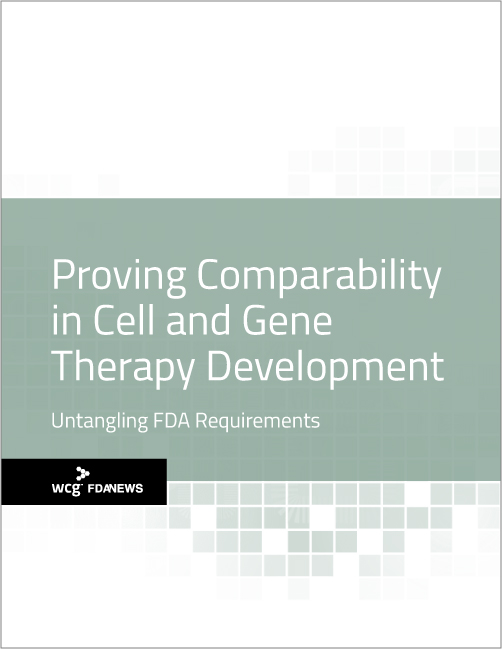Proving Comparability in Cell and Gene Therapy Development: Untangling FDA Requirements
Product Details
If you don’t have a handle on the FDA’s comparability requirements, your minor process changes could cause major issues with quality, efficacy and compliance. Understand — and meet these requirements — with Proving Comparability in Cell and Gene Therapy Development: Untangling FDA Requirements.
For most, comparability is the single biggest challenge in developing and commercializing a cell or gene therapy product. After all, it inevitably involves changes to both the manufacturing process and analytical methods, particularly early in development.
But the FDA and other regulators have been clear: comparability studies to maintain your critical quality attributes (CQAs) are essential to product approval. Without a thorough understanding of the FDA’s comparability requirements and how to meet them, your CQAs will fall short. And product approval? Beyond reach.
This report covers every detail, empowering you to comply with the FDA’s requirements and avoid common missteps: FDA guidances and their implications … types of comparability studies and their methods … assessing risk and developing a comparability protocol … study designs and analytical plans … considerations for clinical and nonclinical studies … and acceptance criteria.
Proving Comparability in Cell and Gene Therapy Development simplifies it all so you can get your therapies approved.
Management Report Takeaways:
- FDA requirements for comparability studies for cell and gene therapy products
- Best practices for risk analysis and mitigation using comparability studies
- How to design an effective comparability protocol for a cell or gene therapy product
- How to construct a statistical approach to comparability
- How to assemble the comparability package to comply with FDA requirements
Successful cell and gene therapies start with compliant CQAs. Ensure yours conform with Proving Comparability in Cell and Gene Therapy Development: Untangling FDA Requirements.
About the Contributors
Scott R. Burger is the principal of Advanced Cell and Gene Therapy, a consulting firm specializing in cell and gene therapy product development, manufacturing and regulatory affairs. He has more than 25 years of experience developing cell and gene therapy products and has consulted for more than 140 companies in North America, Europe, Asia and Australia. Mr. Burger has directed or consulted on process development, manufacturing and regulatory aspects of a wide range of cell and gene therapy products, including CAR T-cell, NK and DC immunotherapies, gene-edited cell therapy products, and stem cell- and somatic cell-based regenerative medicine products.
William E. Janssen is the principal at WEJ Cell and Gene Therapy Consulting Services. He has worked for the past 30+ years in academic institutions translating lab bench models into cell and gene therapy products for administration to patients in early-phase clinical trials. In the course of these efforts, Mr. Janssen has developed and refined methodologies for all aspects of cell-based therapy, from collection through manufacturing and administration.
Who Will Benefit
- Quality professionals
- Regulatory affairs professionals
- Manufacturing process development professionals
- Analytics professionals
- Research and development personnel
- Senior management at cell and gene therapy (pharma/biotech) companies
Add to Cart
Contributors:
Scott R. Burger and William E. Janssen
ISBN-13:
978-1-60430-190-8
Publication date:
March 2022
Page count:
94
Multi-user Access
Save money with a license agreement allowing significant numbers of users access to an electronic version of this book. For multi-user access to multiple titles, FDAnews offers the FDAnews Books Library — a personalized collection of FDAnews publications that is fully searchable. Contact Customer Service for a quote or more information.
Our Guarantee
Not satisfied with your publication? For the PDF version, you must notify FDAnews within 24 hours of receipt of purchase and we will refund 100 percent of your purchase price.
